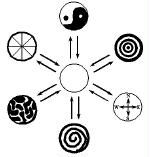|
|
Traditional view of that which is called spirit or spiritual |
|
A Releasing Your Unlimited Creativity discussion topic | |
|
Copyright 2008 by K. Ferlic, All Rights Reserved | |
| RYUC Home Why free? Contact Links Programs Services Contributions | |
|
The traditional concept of spirit is the way the human mind had chosen to address the animating force or energy within our being that it could not see and understand before it began to use models as opposed to myths and/or stories to explain Creation. Traditional uses of the concept of Spirit Spirit, at traditionally defines, is the vital essence or animating force in living organisms especially man, often considered divine in origin. It is seen to be that part of a human being that is incorporeal and invisible and is characterized by intelligence, personality, self-consciousness, and will. In this regard, it can be seen as the mind. In this understanding of spirit, many spiritual traditions see the human being as spirit incarnate in a body. That is, the spirit inhabits the body much the way you or I would inhabit a car. Spirit is also seen a the substance or universal aspect of reality, regarded as independent of, and opposed, to matter. On this particular point as an aside, it needs to be noted that in physics, in many ways, energy was seen as independent of and opposed to matter. This was true until it was shown matter can be converted to energy and energy into matter. In the Bible and similar religious texts, spirit is seen as the creative or animating power or divine influence of God. In religious myths and stories it is a supernatural or immaterial being, as an angel, demon, elf, fairy, etc. It is also seen as a disembodied soul regarded as manifested to the senses often as visible; a ghost; specter. The more mundane or worldly use of the concept of spirit is that spirit is an animating force energy often unseen. For example, it can be a person with reference to any particular characteristic or temper such a the individual being the leading spirit in a community or activity. Or it refers to vivacity or energy such that it is said, "That individual has spirit." It is used to refer to an ardent loyalty or devotion such as embodying the spirit of an organization or ideal. Or it can simply refer to the true intent or meaning as opposed to outward, formal observance such as the spirit of the law. Other uses of spirit refer to a state of mind, mood, or temper but probably more often it refers to the emotional faculty of man characterized by the heart. Give that spirit refers to an unseen activating force arising from within, spirit also refers to strong alcoholic liquor and/or the essence or distilled extract of a substance because of which it can cause an individual to become energized to act. In this regard spirit tends to refer to the activating material of a substance. For example, in pharmacy the spirit is a solution of a volatile principle in alcohol. Or, in dying it is a solution of a tin salt in acid. In alchemy, it is one of four substances, mercury, salt ammonia, sulfur and arsenic. Any of several fluids formerly supposed to inhere in the body and to control various essential processes as nutrition, circulation, and motion. Last but not least is spirit is also seen as the breath of an individual. When an individual dies, they stop breathing and we say, "Their spirit has left the body.". That which is spiritual is seen as pertaining to, having he nature of, or consisting of spirit, as distinguished from matter. Spiritual pertains to or affecting the immaterial nature or soul of man. That which is spiritual is seen as being of, or pertaining to, God or to the soul as acted upon by the Holy Spirit. Spirit is seen as holy, pure, sacred or religious. Spirit is not lay or temporal. Rather, spirit is ecclesiastical Summary conclusion If one looks carefully at all these different uses and definitions of spirit, we can see the concept of spirit is the way mind traditionally has characterized or described the animating force of living organisms if not Creation. However, a more modern view is that the spirit is just the flow of energy or something which gives rise to a flow of energy which animates an aspect of creation/Creation and begs for a new look at the traditional concept of spirit
Related topics
|
|
|
RYUC Home Why free? Contact Links Programs Services Contributions | |
